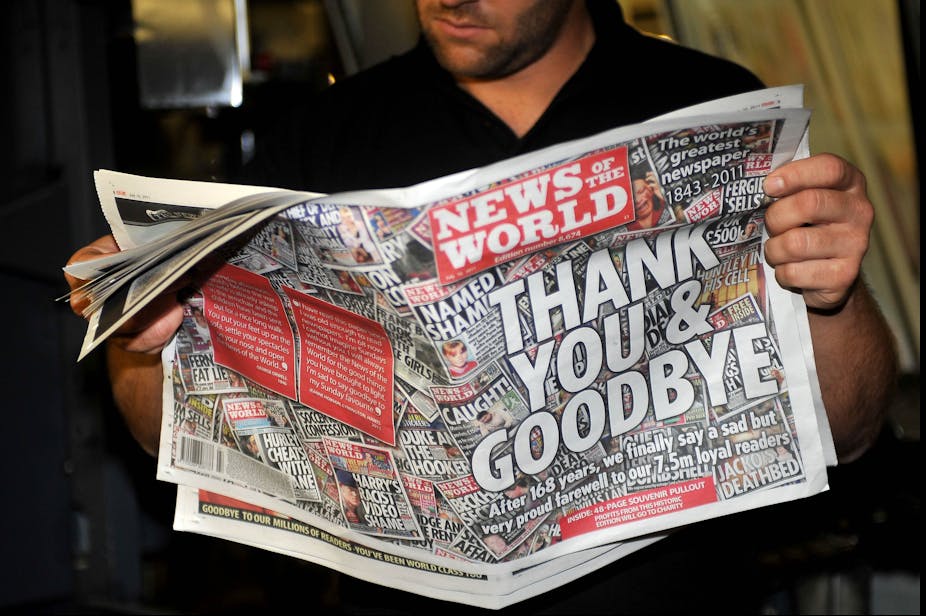The dramatic events around the phone-hacking scandal at Rupert Murdoch’s London News of the World are unprecedented in a major news media organisation in an advanced industrial country. A newspaper closed, a journalist and private investigator jailed and a former editor arrested. Two new inquiries on top of an ongoing police investigation. And worse revelations are yet to come, according to the head of Murdoch’s UK operations and former editor of the News of the World, Rebekah Brooks.
Perhaps the most thoughtful words uttered in this crisis came from the British Prime Minister, David Cameron. “The truth is, we have all been in this together - the press, politicians and leaders of all parties — and yes, that includes me.”
Regulating the news media is difficult, he said, because of accusations of wanting to stifle a free press or even free speech. “But the deeper truth is this: there is a less noble reason. Because party leaders were so keen to win the support of newspapers we turned a blind eye to the need to sort this issue, get on top of the bad practices, to change the way our newspapers are regulated”.
A cosy relationship
The connection between News Corporation and Cameron parallel those of Tony Blair’s Labour government. Cameron must now deeply regret employing the now-disgraced Andy Coulson as his media advisor and developing a social relationship with Rebekah Brooks.
But it was little different in Blair’s day. One of Blair’s media advisors, Lance Price, later commented, “I have never met Mr Murdoch, but at times when I worked at Downing Street he seemed like the 24th member of the cabinet. His voice was rarely heard … but his presence was always felt.”
The unhealthy relations between both Cameron and Blair and Murdoch’s News Corporation are avoidable. What is unavoidable in any nation, including Australia, is the intimate, 200 year old connection between the political life of a nation and its news media. Some degree of freedom of the press is necessary for this relationship to be healthy.
What Murdoch’s newspaper has done is barter this for commercial advantage to build a top selling Sunday newspaper with all its attendant advantages in readership and advertising income.
What does the public have a right to know?
Freedom of the press is a much sullied notion in democratic countries. But for all its titillation and populism, the core practices of journalism have until now managed to avoid credible legal charges of criminality and conspiracy. More importantly, journalists who sometimes bend or break the law, are usually vindicated, legally and/or morally, by an appeal to the notion of a public good.
This is the justification which, for example, is at the heart of the action of Wikileaks and its sources. It is a justification used frequently to defend legal attacks on investigative journalists.
But in this case, no appeal to a higher, public good is possible. The “public right to know” cannot conceivably cover the hacking the phones of murder victims, nor of the relatives of those killed in terrorist attacks nor of the families of dead soldiers.
So in the long term, the worst damage which Murdoch’s newspaper may have done is harm the relative freedom of speech and of the press which invisibly underpins a democracy like our own.
The future of News Corp
The second big implication of the events concern the Murdoch family and the future of direction of News Corporation.
The handling of the crisis and the decision to close the newspaper has come from James Murdoch, and embody his values and priorities, not those of his father. The decision signals James’ status as the heir apparent of the giant media empire. Rupert Murdoch says the closure was “a collective decision” but it is hard to imagine a businessman with his track record voluntarily disposing of a newspaper which brings in over $200m annually and is a key part of his political influence.
The closing of the News of the World is also deeply symbolic given that it was Rupert Murdoch’s first international purchase and showed his ruthlessness in manoeuvring to dominate the British family which once controlled it.
In the longer term, these events suggest that James Murdoch believes that the future of News Corporation lies with TV and movies but not newspapers.
Rupert Murdoch’s reputation
The final implication is to personal reputation of the 80 year old Rupert Murdoch, including the way in which he will be remembered in history.
Rupert Murdoch has always scorned those who questioned the ethics of his journalists. A former Murdoch editor, Bruce Guthrie, in his book Man Bites Murdoch, described how he was mocked when he asked about the ethical code at international meeting of the News Corporation’s editors. Murdoch apparently commented “I see we have a Fairfax wanker in our midst”.
After almost 60 years in the news media, Murdoch has always managed to dismiss his critics. They were “liberals”. Or they were politicians unhappy with the their coverage. Or they were academic types with no practical knowledge of the craft of journalism. And all along Murdoch always had a group who benefited from his political patronage or who were admirers.
All that has ended, at least in Britain and at least for a few years. Murdoch’s reputation is in tatters. If David Cameron allows Murdoch to buy up the rest of the TV broadcaster, BSkyB, he will suffer political damage.
At the very least, the consolidation of Murdoch’s empire will be put on hold for some time. The events from the phone hacking are still unravelling and it’s not clear where and when they may end.
David McKnight’s book: “Rupert Murdoch: Political Crusader” will be published by Allen & Unwin in February 2012.

